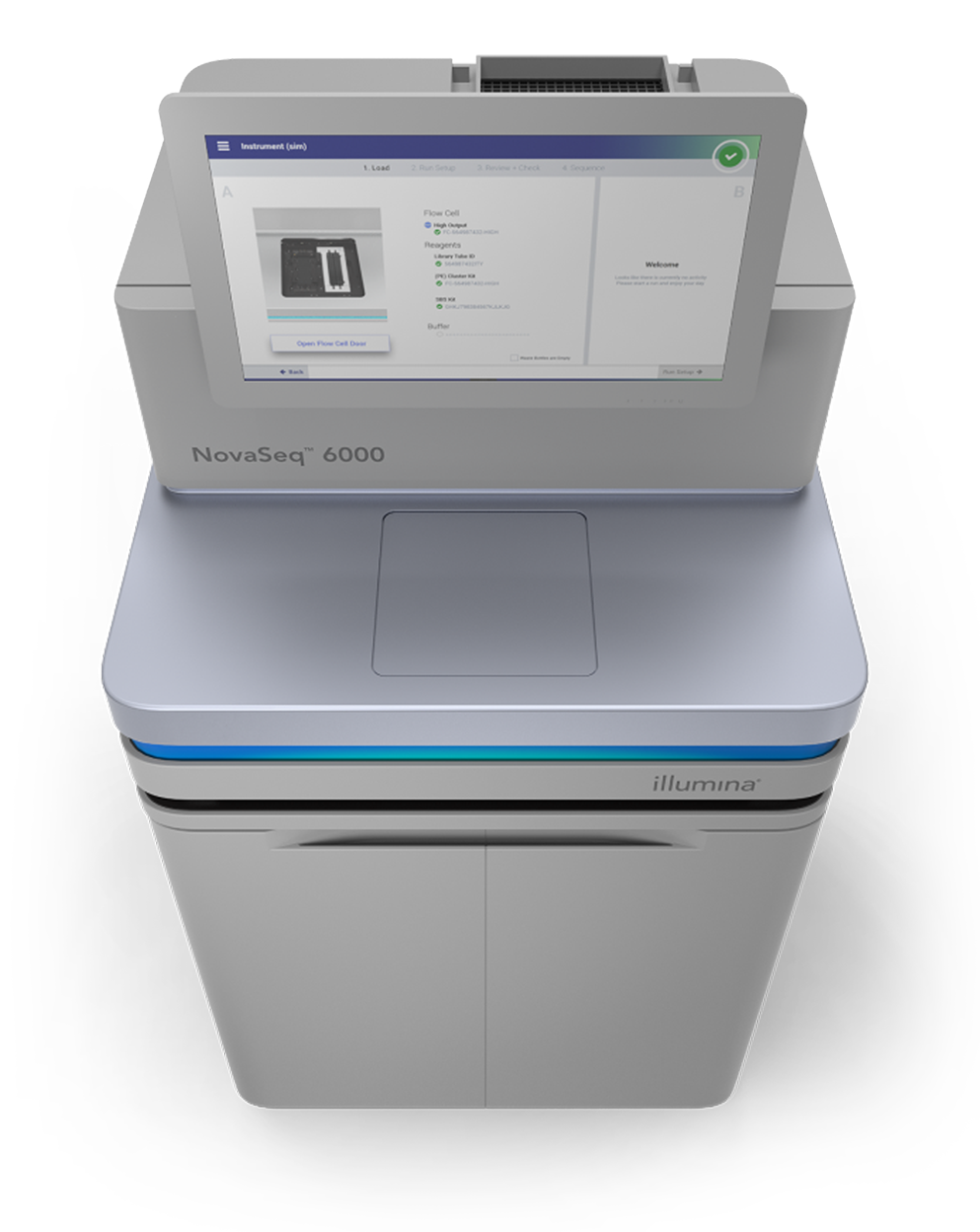NovaSeq 6000 is a sequencer released by Illumina in March 2017.
It is based
on Sequencing by Synthesis (SBS).

Image of NovaSeq 6000: https://www.illumina.com/systems/sequencing-platforms/novaseq.html by Illumina
NovaSeq 6000 is available in the following models:
- NovaSeq - S1
- NovaSeq - S2
- NovaSeq - S4
- NovaSeq - SP
Specifications
| Manufacturer |
Illumina |
| Technology |
Sequencing by Synthesis (SBS) |
| Release date |
March 2017 |
| Price [2] |
$985,000
MSRP as of release date
|
| Type |
Industrial |
Weight |
481 Kg |
| Supports real-time analysis |
No |
| Demultiplexing support |
Yes |
| File format |
FASTQ |
| Read length |
Illumina NovaSeq - S1: 1x300bp, 2x150bp
Illumina NovaSeq - S2: 1x300bp, 2x150bp
Illumina NovaSeq - S4: 1x300bp, 2x150bp
Illumina NovaSeq - SP: 1x500bp, 2x250bp
|
| Run time |
Illumina NovaSeq - S1: 13 to 25 hours
Illumina NovaSeq - S2: 16 to 36 hours
Illumina NovaSeq - S4: 14 to 44 hours
Illumina NovaSeq - SP: 13 to 34 hours
|
| Reagent cost per Gb [1] |
Illumina NovaSeq - S1: $12.09
Illumina NovaSeq - S2: $8.84
Illumina NovaSeq - S4: $5.53
Illumina NovaSeq - SP: $12.09
|
| Data quality [3] |
Illumina NovaSeq - S1: ≥ 90% of bases higher than Q30
Illumina NovaSeq - S2: ≥ 90% of bases higher than Q30
Illumina NovaSeq - S4: ≥ 90% of bases higher than Q30
Illumina NovaSeq - SP: ≥ 90% of bases higher than Q30
|
| Maximum output per run (Gb)[4] |
Illumina NovaSeq - S1: 500.00
Illumina NovaSeq - S2: 1250.00
Illumina NovaSeq - S4: 3000.00
Illumina NovaSeq - SP: 400.00
|
| Primary error type [5] |
Substitutions |
Notes about the specifications
More about the NovaSeq 6000
The Illumina NovaSeq 6000 sequencing system caters to life science researchers with high-throughput sequencing demands. It succeeds the Illumina HiSeq X Ten system, offering significant advancements in data output, flexibility, and ease of use. While not the latest sequencer from Illumina (NovaSeq 6000 launched in 2017), it remains a powerful platform for various applications.
Key Innovations
The NovaSeq 6000 boasts several key innovations that translate to superior performance:
- Patterned Flow Cells: These cells contain billions of nanowells arranged in a precise grid, enabling even spacing of sequencing clusters and tighter cluster densities, dramatically increasing data output compared to previous models.
- Dual Flow Cell Mode: The system accommodates two flow cells simultaneously, doubling potential throughput or allowing researchers to run projects with different requirements alongside each other.
- High-Resolution Imaging: Upgraded optics deliver high-speed, high-resolution scanning, which contributes to the overall throughput increase.
Features and Technologies
The NovaSeq 6000 leverages Illumina's proven sequencing-by-synthesis (SBS) technology with improvements:
- 2-Channel SBS Chemistry: This refined chemistry, also used in the NextSeq 550, enhances sequencing efficiency and data processing, while maintaining the data quality of the 4-channel SBS chemistry.
- Cartridge-Based Consumables: Pre-filled and ready-to-use cartridges streamline workflow and minimize user error.
- Base Calling Accuracy: Maximum data quality is 90% of bases >Q30 (phred score >30), indicating a base call error rate of less than 0.1%.
- Read Length: Up to 150 bp paired-end reads (250 bp with the SP flow cell), enabling comprehensive coverage of complex genomes or transcriptomes.
Intended Uses and Specific Applications
The NovaSeq 6000's versatility makes it suitable for a broad range of applications:
- Whole Genome Sequencing (WGS): Deep sequencing of entire genomes for de novo assembly, variant discovery, and population genetics studies. Compatible library prep kits include Illumina DNA Prep and DNA PCR Free Library Prep Kits.
- Whole Exome Sequencing (WES): Targeted sequencing of protein-coding regions for identifying mutations associated with genetic diseases. Enrichment kits like Agilent SureSelect Human All Exon V6 are commonly used.
- RNA Sequencing (RNA-Seq): Characterization of gene expression profiles for differential expression analysis, alternative splicing detection, and transcriptome assembly. Kits like TruSeq Stranded mRNA and Illumina Stranded Total Prep are popular choices.
- Targeted Sequencing: Deep sequencing of specific genomic regions of interest for variant discovery in targeted panels or single genes. AmpliSeq and TruSight targeted enrichment kits are well-suited for this application.
Comparison with Competing Instruments
Here's a comparison of NovaSeq 6000 with similar-throughput instruments:
- Illumina NovaSeq X: The NovaSeq X offers higher data output per run and more up-to-date Illumina support, but it has a larger footprint and higher upfront cost.
- Ultima Genomics UG100: This platform boasts faster run times and longer read lengths but has a much higher upfront cost and slightly lower data quality compared to NovaSeq 6000.
- Complete Genomics DNBSEQ-T7: While offering similar read lengths and faster run times, the DNBSEQ-T7 has a lower overall data output when taking into account all the flow cells available for the NovaSeq 6000 and slightly lower accuracy.
Special Considerations
Choosing the ideal sequencing platform depends on specific research needs. Here's why NovaSeq 6000 might be a good fit:
- High Output and Scalability: The system excels at generating large datasets for projects requiring deep coverage or whole genome analysis of multiple samples.
- Flexibility: The ability to run single or dual flow cells and accommodate diverse library prep workflows caters to a wide range of applications.
- Established Technology: Illumina's sequencing-by-synthesis approach is well-validated, with extensive resources and support available.
Need sequencing done on a Illumina NovaSeq 6000 or a specific instrument? Tell us about your project here, and we'll connect you with a qualified provider.
This information on this page is up-to-date as of April 10, 2024 and based on the spec
sheets published by the manufacturer.